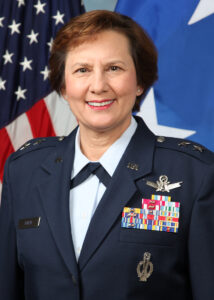VCJCS Mulls Newest Domain: Electromagnetic Spectrum
Posted on

Air Force electronic warfare officers aboard an RC-135 Rivet Joint
WASHINGTON: The Vice-Chairman of the Joint Chiefs of Staff is taking a “very serious” look at to making the electromagnetic spectrum a formal “domain” of military operations, a top aide to the Pentagon’s chief information officer told me this morning. The move would elevate the ethereal realm of radio waves and radar to the same level of importance as land, sea, air, space, and cyberspace, with ramifications rippling across the military’s budget, training, and organization.
We’ve written for years about the military’s anxiety that it has “lost the electromagnetic spectrum” to increasingly sophisticated adversaries like Russia and China, who can jam or spoof the networks and sensors on which US operations depend. We’ve also written about the effort to elevate the spectrum to a domain to ensure it gets top-level attention and resources, an effort in which the Pentagon CIO plays a leading role. Now it looks like that effort is gathering major momentum.

Maj. Gen. Sandra Finan
“Spectrum operations are so important that we ought to look at declaring the electromagnetic spectrum a domain,” said Maj. Gen. Sandra Finan, deputy CIO for C4 and information infrastructure, told an AFCEA conference this morning. “We are going to be operating offensively and defensively across that domain,” she continued. “So I think that’s one of the most important things that we can see in the future.”
Such a blunt endorsement of the domain idea stands in stark contrast to CIO Terry Halvorsen’s cautious statement on the subject five months ago. So I approached Maj. Gen. Finan after her public remarks to ask her how the effort has progressed.
“At the Vice-Chairman level, there is discussion on electromagnetic spectrum as a domain,” Finan told me. She confirmed that meant Gen. Paul Selva, Vice-Chairman of the Joint Chiefs, who — among many other roles — co-chairs a high-level Electronic Warfare Executive Committee (EW EXCOM) chartered by Deputy Secretary of Defense Bob Work.
“It is very heartily being debated right now. [It] is very serious,” Finan said. “It is being talked about. There are papers being written. So it’s not just a theory in somebody’s head, it is actually being debated, and I think we’re seeing some fairly positive movement on [making the spectrum] a domain.”
“The question will be how do we do it,” the general caveated. “There’s lots of complications.” The recognition of cyberspace as a domain is the big precedent, she said — and cyberspace overlaps with the electromagnetic spectrum in the form of wireless networks, she noted.
“We learned a lot of lessons from cyber,” Finan said. “Do you stand up an organization” to lead efforts in the new domain, as Cyber Command does for cyberspace? “How do you stand up an organization? What do you bring together? How do you defend it? How do you operate offensively? How do you apply all…the principles of war?”
“All of that has to be thought through,” Finan said. “You can’t just declare, ‘ok, from now on, it’s a domain,’ and everyone goes, ‘well, what does that mean’? So you have to think through all the consequences of that — and there is very serious talk on that right now.”
Subscribe to our newsletter
Promotions, new products and sales. Directly to your inbox.
